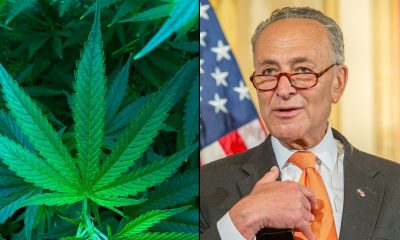Politics
Prohibitionist Group Presses Schumer To Bring House-Passed Marijuana Research Bill To A Vote

A group of researchers and other advocates associated with the prohibitionist organization Smart Approaches To Marijuana (SAM) is calling on Senate Majority Leader Chuck Schumer (D-NY) to swiftly bring a House-passed cannabis research bill to a vote.
Twelve members of SAM’s Scientific Advisory Board sent a letter to Schumer on Tuesday, imploring him to advance the Medical Marijuana and Cannabidiol Research Expansion Act “as quickly as possible.”
The House approved the legislation, sponsored by Reps. Earl Blumenauer (D-OR) and Andy Harris (R-MD), in July. While lawmakers signaled that the Senate would promptly follow suit and deliver the bill to President Joe Biden’s desk, it’s since lingered in the chamber as leadership has focused on finalizing a separate package of incremental cannabis reforms that’s being called “SAFE Plus.”
That omnibus legislation is expected to include a cannabis research component, as well as provisions on issues like marijuana banking, veterans’ medical cannabis access and expungements. But the SAM advisory board members are asking that Schumer act sooner than later on the standalone science bill.
“This bill would streamline the process for research necessary to improve our understanding of marijuana and its effects on the human brain and body,” the letter, which was shared exclusively with Marijuana Moment, says. “As existing research already shows, there are myriad potential harms and benefits to marijuana and its various compounds. But we need to have a greater understanding of exactly how marijuana affects its consumers.”
In March, the Senate did pass a virtually identical cannabis research measure from Sens. Dianne Feinstein (D-CA), Brian Schatz (D-HI) and Chuck Grassley (R-IA)—an action that Schumer included in a list of “historic achievements” last month—but the proposal was later lightly revised as part of a “compromise” with the House.
SAM’s board said that there’s an “urgent” need to enact the modified bill, especially in light of recent surveys that show more adults are trying cannabis as more states implement legalization.
“The immediate passage of this bill is vital and would continue the support for science you have exhibited so consistently through your remarkable political career,” the letter says. “We appreciate your consideration of our concerns and welcome the opportunity to discuss them further with you.”
(Not all 12 letter signatories from SAM’s Scientific Advisory Board have a background in science; one is a former judge, for example.)
Marijuana Moment reached out to Schumer’s office for comment on the current thinking for the standalone research bill, but a representative did not respond by the time of publication.
Given the widespread, bipartisan interest in advancing marijuana research—a proposal that’s unified staunch prohibitionists and pro-legalization lawmakers alike—it’s likely that the bill would handily clear the Senate if it’s brought to the floor. But it’s also possible that Schumer is strategically holding the standalone, at least until SAFE Plus is filed.
Because the legislative package may contain the popular research component, passing the Medical Marijuana and Cannabidiol Research Expansion Act first could potentially jeopardize support for the broader bill from certain members who might otherwise get on board if it is the vehicle to getting the science reforms enacted.
That’s not an especially high concern for SAM, though, as the organization is principally against other provisions that are under consideration for SAFE Plus, namely any reform that would free up banking services for state-legal cannabis businesses.
“It is vital that Congress sends the Medical Marijuana and Cannabidiol Research Expansion Act to President Biden’s desk,” SAM President Kevin Sabet said in a press release. “With more Americans using marijuana today than ever before, it is critical that we streamline the process for research.”
“This is the only marijuana reform legislation that has enough support to pass Congress,” he argued. “Getting this bill through the Senate would be a win for public health and reform. Senator Schumer should whatever he can to get H.R.8454 across the finish line.”
If the bill does make it through the chamber and is signed by Biden, it would mark the first piece of standalone congressional marijuana reform legislation to ever become law.
—
Marijuana Moment is tracking more than 1,500 cannabis, psychedelics and drug policy bills in state legislatures and Congress this year. Patreon supporters pledging at least $25/month get access to our interactive maps, charts and hearing calendar so they don’t miss any developments.
![]()
Learn more about our marijuana bill tracker and become a supporter on Patreon to get access.
—
Under the legislation, the U.S. attorney general would be given a 60-day deadline to either approve a given application or request supplemental information from the marijuana research applicant. It would also create a more efficient pathway for researchers who request larger quantities of cannabis.
Further, the bill would encourage the Food and Drug Administration (FDA) to develop cannabis-derived medicines. One way it proposed doing so is by allowing accredited medical and osteopathic schools, practitioners, research institutions, and manufacturers with a Schedule I registration to cultivate their own cannabis for research purposes.
The Drug Enforcement Administration (DEA) would get a mandate to approve applications to be manufacturers of marijuana-derived, FDA-approved drugs under the bill. Manufacturers would also be allowed to import cannabis materials to facilitate research into the plant’s therapeutic potential.
Another section would require the Department of Health and Human Services (HHS) to look at the health benefits and risks of marijuana as well as policies that are inhibiting research into cannabis that’s grown in legal states and provide recommendations on overcoming those barriers.
The bill further states that it “shall not be a violation of the Controlled Substances Act (CSA) for a State-licensed physician to discuss” the risk and benefits of marijuana and cannabis-derived products with patients.
Both the House and Senate passed earlier versions of their separate but similar cannabis research bills in late 2020, but nothing ended up getting to then-President Donald Trump’s desk by the end of the last Congress.
Congressional researchers separately released a report in March that details the challenges posed by ongoing federal prohibition and the options that lawmakers have available to address them.
DEA has taken steps in recent years to approve new cultivators of marijuana to be used in studies, and the National Institute on Drug Abuse (NIDA) recently published a solicitation for applications from those authorized growers as it looks for new contractors to supply the agency with cannabis for research purposes.
Meanwhile, large-scale infrastructure legislation that was signed by Biden late last year contains provisions aimed at allowing researchers to study the actual marijuana that consumers are purchasing from state-legal businesses instead of having to use only government-grown cannabis.
Lawmakers like Blumenauer had hoped that the bicameral marijuana research bill would have permitted such activity, but the congressman said it was omitted following negotiations with the Senate.
NIDA Director Nora Volkow told Marijuana Moment last year that scientists have been unnecessarily limited in the source of cannabis they’re permitted to study—and it makes sense to enact a policy change that expands their access to products available in state-legal markets.
Meanwhile, as Schumer weighs options for the research legislation and works to finalize a cannabis reform package, others are still pushing for a more comprehensive end to federal marijuana prohibition, as would be accomplished under a legalization bill the leader filed in July alongside Senate Finance Committee Chairman Ron Wyden (D-OR) and Sen. Cory Booker (D-NJ).
Booker said last week that the Cannabis Administration and Opportunity Act (CAOA) would effectively address the “twin crisis” of ongoing marijuana arrests and a lack of banking access for small cannabis businesses under federal prohibition.
He’s also become more vocal about his interest in reaching an equity-centered compromise for SAFE Plus, which the senator signaled will be introduced during the lame duck session after the November midterm elections.
Rep. Ed Perlmutter (D-CO), the House sponsor of the standalone marijuana banking bill, said he recently spoke with Schumer at an event at the White House and discussed the need to enact the bipartisan reform this session.
Read the SAM letter to Schumer about passing the marijuana research bill below:
Voters In Five Texas Cities Will Decide On Marijuana Decriminalization In November, Activists Say
Photo courtesy of Mike Latimer.
















